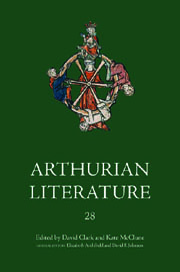Book contents
- Frontmatter
- Contents
- General Editors' Foreward
- Preface
- List of Contributors
- Abbreviations
- I Reading Malory's Bloody Bedrooms
- II (Dis)Figuring Transgressive Desire: Blood, Sex, and Stained Sheets in Malory's Morte Darthur
- III Bewmaynes: the threat from the kitchen
- IV Sibling Relations in Malory's Morte Darthur
- V ‘Traytoures’ and ‘Treson’: the Language of Treason in the Works of Sir Thomas Malory
- VI ‘The Vengeaunce of My Brethirne’: Blood Ties in Malory's Morte Darthur
- VII Malory and the Scots
- VIII Blood, Faith and Saracens in ‘The Book of Sir Tristram’
- IX Barriers Unbroken: Sir Palomydes the Saracen in ‘The Book of Sir Tristram’
- X Virginity, Sexuality, Repression and Return in the ‘Tale of the Sankgreal’
- XI Launcelot in Compromising Positions: Fabliau in Malory's ‘Tale of Sir Launcelot du Lake’
- Title in the Series
VII - Malory and the Scots
Published online by Cambridge University Press: 05 February 2013
- Frontmatter
- Contents
- General Editors' Foreward
- Preface
- List of Contributors
- Abbreviations
- I Reading Malory's Bloody Bedrooms
- II (Dis)Figuring Transgressive Desire: Blood, Sex, and Stained Sheets in Malory's Morte Darthur
- III Bewmaynes: the threat from the kitchen
- IV Sibling Relations in Malory's Morte Darthur
- V ‘Traytoures’ and ‘Treson’: the Language of Treason in the Works of Sir Thomas Malory
- VI ‘The Vengeaunce of My Brethirne’: Blood Ties in Malory's Morte Darthur
- VII Malory and the Scots
- VIII Blood, Faith and Saracens in ‘The Book of Sir Tristram’
- IX Barriers Unbroken: Sir Palomydes the Saracen in ‘The Book of Sir Tristram’
- X Virginity, Sexuality, Repression and Return in the ‘Tale of the Sankgreal’
- XI Launcelot in Compromising Positions: Fabliau in Malory's ‘Tale of Sir Launcelot du Lake’
- Title in the Series
Summary
Malory's ‘Tale of Sir Gareth of Orkney’ is one of the most optimistic books in the Morte Darthur, but close to the end of it comes this memorable statement:
For evir aftir sir Gareth had aspyed sir Gawaynes conducions, he wythdrewe hymself fro his brother sir Gawaynes felyshyp, for he was evir vengeable, and where he hated he wolde be avenged with murther: and that hated sir Gareth. (360)
This narratorial comment is often cited as an instance of how Malory is concerned to connect the material in the Gareth book to later parts of the Morte Darthur. The Gareth book does not have the readily identifiable French or English sources that Malory's other books have, and, despite its utilization of traditional motifs like the bel inconnu topos, is more of Malory's own making. The book thus has a more freestanding character than most of the others. But these remarks about Gawayne in fact tie the story back to the way in which Gawayne has begun to be portrayed in the earlier parts of the Morte, as well as hinting at how this element will be seriously enhanced in the Tristram book, and will contribute dramatically to the disastrous collision of events in the final two books. The Balyn episode has already shown the enmity of Gawayne and some of his brothers towards King Pellynore, who has killed their father King Lot in battle.
- Type
- Chapter
- Information
- Arthurian Literature XXVIIIBlood, Sex, Malory: Essays on the 'Morte Darthur', pp. 107 - 120Publisher: Boydell & BrewerPrint publication year: 2011



